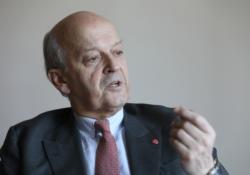
Thomas Heine-Geldern, the new executive president of Aid to the Church in Need International, gestures during an interview with Catholic News Service Nov. 28 in Washington. (CNS photo/Bob Roller)
WASHINGTON (CNS) — Ultranationalism is the chief reason behind the growing number of countries ranked worse than before on guaranteeing citizens their religious freedom, according to Thomas Heine-Geldern, executive president of Aid to the Church in Need.
One example was India’s “Hinduistic nationalist approach,” Heine-Geldern said, “which leads to condemning everyone who is a non-Hindu a non-Indian. Then comes the discrimination.”
Aid to the Church in Need is an international papal charity that provides pastoral and humanitarian aid to persecuted and oppressed Christians and supports various church projects in more than 140 countries.
The organization’s report, “Religious Freedom in the World 2018” — one of the few non-U.S. sources for unbiased documenting of religious freedom issues — cited the case of 10 Muslims who have been murdered by radical Hindus who are known as “cow vigilantes.” Cows are considered sacred in Hinduism. The report was released Nov. 27.
[hotblock]
The report’s executive summary took note of documentation by the human rights group Persecution Relief, which said that last year, there were 736 documented attacks against Christians in India, more than double 2016’s figure of 358.
Compared to Aid to the Church in Need’s 2016 report, the religious freedom outlook is worse in Brunei, China, India, Indonesia, Iran, Kazakhstan, Kyrgyzstan, Libya, Maldives, Mauritania, Myanmar, Pakistan, Russia, Somalia, Tajikistan, Turkey and Yemen. State and non-state actors are cited in the report as the predominant violators of religious freedom.
The situation, the report said, is unchanged in Afghanistan, Algeria, Azerbaijan, Bangladesh, Bhutan, Egypt, Eritrea, Laos, Nigeria, North Korea, the Palestinian Territories, Qatar, Saudi Arabia, Sudan, Turkmenistan, Ukraine, Uzbekistan and Vietnam.
Countries where religious freedom improved included Kenya, Tanzania and, surprisingly, Iraq and Syria.
In Iraq, Heine-Geldern said, “we cannot make people return” to their homes after the genocidal terror campaign waged by Islamic State earlier this decade that emptied many Iraqi towns of their Christian populations. “But for those who do want to come back, we can help them,” he told Catholic News Service in a Nov. 28 interview in Washington, where he was meeting with officials of the U.S. Conference of Catholic Bishops.
[tower]
The recovery is fitful. “Religious Freedom in the World 2018” described a U.S. House hearing at which witness Stephen Rasche, a Chaldean Catholic from Irbil, Iraq, said Christian schools in the Christian-majority towns of Teleskov and Batnaya were not “completed” but instead were unusable. He charged they received only “one thin coat of paint on the exterior surface walls, with freshly stenciled UNICEF logos every 30 feet.”
Aid to the Church in Need has started what it has called a “Marshall Plan” to rebuild Christian enclaves in Iraq, although Heine-Geldern said “there are some places” in the country where it is advisable to not use that term. (The original Marshall Plan was a U.S. initiative to rebuild Western Europe after World War II.)
Even so, he noted, the charity was able to convince European governments of the need to reinvest in Iraqi infrastructure so it could focus on what Heine-Geldern called “pastoral needs.”
“We are, first, a pastoral charity,” he said.
Heine-Geldern added his job is “to listen” to the needs of dioceses as explained by their bishops, and to find sufficient financing for those needs where possible. Aid to the Church in Need last year approved 5,357 projects worldwide, including 1,212 construction projects.
During 2017, Aid to the Church in Need raised close to $141 million. U.S.-based donors, Heine-Geldern said, accounted for about 10 percent of that total.
By the charity’s count, it gave financial support to 37,797 catechists and lay pastoral helpers, 13,643 seminarians — one in every nine worldwide, it estimated — and 13,643 women religious in either their formation or their apostolate.
In 2017, Aid to the Church in Need also collected more than 1.5 million Mass offerings, which benefited more than 40,000 priests. “For many of these priests, the Mass offerings are their sole source of income,” Heine-Geldern told CNS.
It also has become a major publisher. An Aid to the Church in Need youth catechism is now published in 58 languages, which gives a synopsis of the church’s social encyclicals for those ages 12-13, according to Heine-Geldern. A new children’s catechism has thus far been published in two languages.
The charity’s children’s Bible, though, has been translated into 178 languages since it was introduced in 1979, and 43 million copies have been distributed. “For a lot of people on the earth, it’s the only book they’ve ever had,” Heine-Geldern said.
PREVIOUS: House passes measure to provide humanitarian aid to genocide victims
NEXT: Texas archdiocese ‘fully cooperating’ with search of offices in abuse case


Share this story